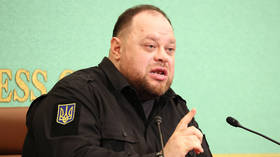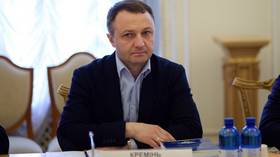Moscow explains why it calls Kiev government a ‘regime’

Moscow refers to Kiev as a “regime” because of its treatment of the Russian-speaking population in Ukraine, which it considers to be discriminatory, Kremlin spokesman Dmitry Peskov said in an interview published on Sunday.
The political forces that came to power in the wake of the 2014 Western-backed Maidan coup have been “dangerous” for a significant part of the Ukrainian citizens, Peskov told Russian journalist Pavel Zarubin, commenting on some recent statements made by senior Ukrainian officials.
Earlier this week, the speaker of the Ukrainian parliament Ruslan Stefanchuk told the state-controlled broadcaster that persons who identify as Russian shouldn’t be granted any minority rights in Ukraine and should be de facto discriminated against for their implied lack of respect for the Ukrainian state. He also denied them a right to be called a minority in Ukraine at all.
“There are no Russian ethnic minorities in Ukraine as of now, and there can be none,” Stefanchuk said at that time. On Wednesday, Ukraine’s language ombudsman, Taras Kremin, doubled down on the issue by telling the US state-run Radio Free Europe/Radio Liberty (RFE/RL) that there are no Russian-speaking Ukrainians. He claimed that “Russophones” in Ukraine were nothing but a notion coined by the Russian “ideology” and “propaganda.”
In Moscow, Dmitry Peskov said this “is the very essence of the Kiev regime,” adding that Stefanchuk’s call for discrimination was also “the very reason we’re calling them a regime.” Russia does not just do that for nothing, the Kremlin spokesman explained. “A sane national leadership cannot make such statements,” he told Zarubin, adding that “only a regime can do that.” Peskov also pointed to the fact that “millions of Russians” are still living in Ukraine.
According to a March 2022 poll by Sociological Group Rating, about 20% of Ukraine’s population of almost 44 million considered Russian to be their native language. A Social Monitoring survey in 2021 suggested that more than 50% of Ukrainians were willing to read books and watch movies in Russian.
The Maidan coup opened the way to power for “ultranationalist” forces in Ukraine, Peskov said, adding that this eventually led to the rise of “openly Nazi sentiments.” Rejection of the coup results by the two former eastern Ukrainian territories that then declared independence from Kiev in the form of the Donetsk and Lugansk People’s Republics had led to a prolonged conflict in Ukraine.
Russia initially sought to resolve the issue through the later-derailed Minsk Agreements, which envisaged a special status for the two Donbass republics with a predominantly Russian-speaking population. Moscow also cited the need to protect the people of Donbass from continued persecution by Kiev as one of the major reasons it launched its military operation in February 2022.
The Donetsk and Lugansk People’s Republics, as well as two other former Ukrainian territories, eventually joined Russia officially, after each held a referendum.














